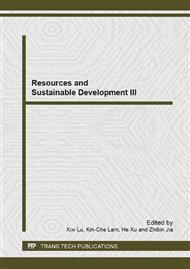p.2080
p.2084
p.2089
p.2096
p.2101
p.2105
p.2110
p.2116
p.2120
Analysis on Environmental Protection from the Perspective of Environmental Democracy
Abstract:
Environmental democracy is the political basis of the sustainable development of the environment. From the perspective of political science, the public needs to be involved both in the process of the making of environmental policies and in avoiding government failures in environmental protection. From the perspective of economics, sustainable development of the environment requires a democratic production mode and in avoiding “the tragedy of public land” the public needs to be involved. From the legal perspective, solving environmental hazard incidents involves environmental hazard litigation. From the perspective of the international political science, in order to build a society in which the individual rights of us and our responsibilities to the neighborhood, the community and the earth are deemed to be intrinsically connected, we need to democratize the decision-making process of the social policies.
Info:
Periodical:
Pages:
2101-2104
Citation:
Online since:
June 2014
Authors:
Price:
Сopyright:
© 2014 Trans Tech Publications Ltd. All Rights Reserved
Share:
Citation:


